The terrorism paradox
Under attack by a profoundly illiberal foe, Europe is reconsidering its liberal, post-modern ideals
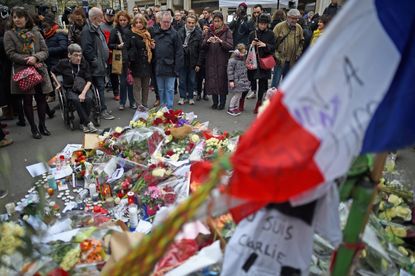

It seemed like such a noble idea. When the European Union knit the continent into a single, postmodern entity, nationalism and religious affiliations from centuries past were supposed to give way to a broader, more enlightened identity. But the EU's idealistic creators did not foresee how stubborn national identity can be — ask the Greeks today how they feel about the Germans (and vice versa). Nor did the EU anticipate the influx of millions of immigrants uninterested in assimilating Western ideals of secularism, women's equality, and free speech. Homegrown Islamist terrorism has now shocked EU leaders into a re-examination of their policies, such as letting citizens move freely among countries without so much as a passport check. Up to now, the EU has not even maintained a no-fly list or even a central database of suspected terrorists. Such aggressive security measures seemed so excessive, so backward, so…American.
This is the central conundrum of our times: To protect their liberal ideals from illiberal fanatics, Western societies are tracking millions of phone calls, spying on emails and Facebook pages, and using scanners to look through airline travelers' clothes. France is now even arresting Muslims for expressing forbidden ideas. Provoking an overreaction is one of terrorists' goals; the West has succumbed to that temptation more than once. But there is no choice but to react when alienated jihadists detonate homemade bombs in Boston, hack off heads in London, and launch commando attacks on magazines and kosher supermarkets in Paris. Will modernity ultimately outsmart and outlast Dark Age fundamentalism? We will not have a final answer for decades.
Subscribe to The Week
Escape your echo chamber. Get the facts behind the news, plus analysis from multiple perspectives.

Sign up for The Week's Free Newsletters
From our morning news briefing to a weekly Good News Newsletter, get the best of The Week delivered directly to your inbox.
From our morning news briefing to a weekly Good News Newsletter, get the best of The Week delivered directly to your inbox.
Create an account with the same email registered to your subscription to unlock access.
Sign up for Today's Best Articles in your inbox
A free daily email with the biggest news stories of the day – and the best features from TheWeek.com
William Falk is editor-in-chief of The Week, and has held that role since the magazine's first issue in 2001. He has previously been a reporter, columnist, and editor at the Gannett Westchester Newspapers and at Newsday, where he was part of two reporting teams that won Pulitzer Prizes.
-
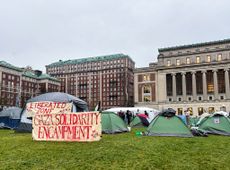 'Republicans want to silence Israel's opponents'
'Republicans want to silence Israel's opponents'Instant Opinion Opinion, comment and editorials of the day
By Harold Maass, The Week US Published
-
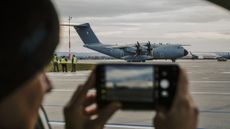 Poland, Germany nab alleged anti-Ukraine spies
Poland, Germany nab alleged anti-Ukraine spiesSpeed Read A man was arrested over a supposed Russian plot to kill Ukrainian President Zelenskyy
By Peter Weber, The Week US Published
-
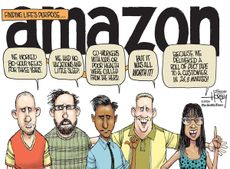 Today's political cartoons - April 19, 2024
Today's political cartoons - April 19, 2024Cartoons Friday's cartoons - priority delivery, USPS on fire, and more
By The Week US Published
-
 Gunman kills 6, himself at Colorado Springs birthday party
Gunman kills 6, himself at Colorado Springs birthday partySpeed Read
By Peter Weber Published
-
 Columbus police fatally shoots Ma'Khia Bryant, 16, quickly releases body-cam footage
Columbus police fatally shoots Ma'Khia Bryant, 16, quickly releases body-cam footageSpeed Read
By Peter Weber Last updated
-
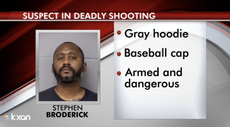 Austin police, feds searching for ex-sheriff's deputy accused of killing 3, in Sunday's 2nd mass shooting
Austin police, feds searching for ex-sheriff's deputy accused of killing 3, in Sunday's 2nd mass shootingSpeed Read
By Peter Weber Last updated
-
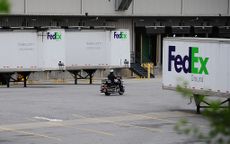 At least 8 dead in Indianapolis FedEx shooting
At least 8 dead in Indianapolis FedEx shootingSpeed Read
By Peter Weber Last updated
-
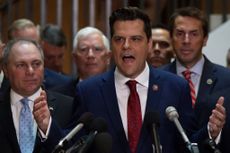 Scalise says GOP will 'take action' on Gaetz if DOJ moves ahead with 'formal' case
Scalise says GOP will 'take action' on Gaetz if DOJ moves ahead with 'formal' caseSpeed Read
By Catherine Garcia Last updated
-
 Watchdog report: Capitol Police knew about potential for violence on Jan. 6, but held back
Watchdog report: Capitol Police knew about potential for violence on Jan. 6, but held backSpeed Read
By Catherine Garcia Published
-
 Former classmate arrested in 1996 disappearance of college student Kristin Smart
Former classmate arrested in 1996 disappearance of college student Kristin SmartSpeed Read
By Catherine Garcia Published
-
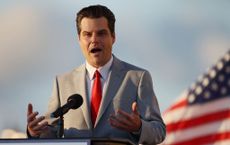 Report: Gaetz associate has been cooperating with federal investigators since last year
Report: Gaetz associate has been cooperating with federal investigators since last yearSpeed Read
By Catherine Garcia Last updated